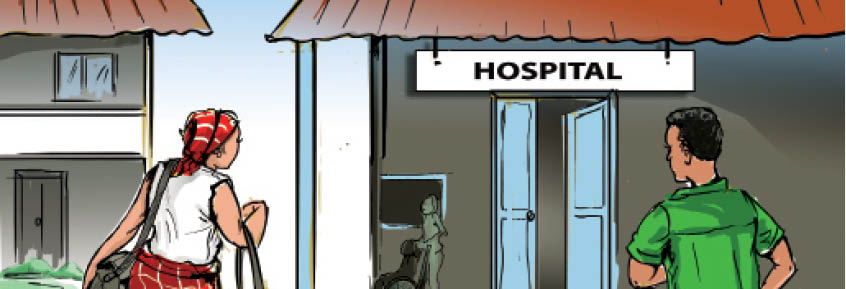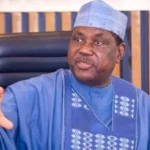As the COVID-19 pandemic rages, experts say it has further underscored the need for increased effort and innovative approaches towards ensuring health security in the country, as well as attainment of Universal Health Coverage (UHC).
The experts said doing so would also improve the country’s health system and indices.
UHC means ensuring people have access to quality health services without suffering financial hardship.
Over 70 per cent of Nigerians pay their health bills from their little incomes thereby making it difficult for many to access healthcare.
Prof Mohammed Nasir Sambo, the Executive Secretary of the National Health Insurance Scheme (NHIS), in an interview with Daily Trust, said it was retrogressive for over 70 per cent of the money coming into the health system to be coming from individuals.
Prof Sambo said it was important to ensure that people did not go into poverty as a result of seeking healthcare services.
The ways to ensure an efficient health system through UHC and health security formed the crux of the recent Fourth Annual Legislative Summit on Health organised by the Legislative Network for Universal Health Coverage in collaboration with the World Health Organisation (WHO), LISDEL, the United States Agency for International Development (USAID) and other partners.
Speaking during a panel discussion on “Where we are and what to do differently in the quest for UHC”, the experts who included Dr Niyi Ogini, Dr Njide Ndili and Hon Tanko Sununu, Chairman House of Representatives Committee on Healthcare Services, said Nigeria had been unable to achieve UHC since 1978 because of lack of accountability and transparency for funds appropriated to the health sector and other related issues.
They recommended contributory health insurance, more funding for health from states, formal sector mobilisation to sustain social health insurance and increased risk pull through adoption of digital innovations.
The Chairman of the National Emergency Medical Treatment Committee, Dr Felix Ogedengbe, said Nigeria could not attain UHC without effective Emergency Medical Services (EMS).
Dr Ogedengbe said, “When the other levels of healthcare are weak, the burden falls on EMS.”
Senior Health Specialist at the International Finance Corporation of the World Bank Group, Olumide Okunola, said adequate funding was key to UHC, noting that it would help the country prepare for epidemics and pandemics.
Other experts also called for the involvement of the informal sector in achieving the “health for all” campaign.
Health security
The Vice President of Nigeria, Yemi Osinbajo, said it was important to always set aside funds for public health emergencies.
Represented by the Minister of State for Health, Dr Olorunnimbe Mamora, Osinbajo he said, “Our experience in the last one year of COVID-19 in Nigeria has exposed the vulnerability of our health system and the importance of preparedness, diagnosis and response mechanism.
“Such fund should only be utilised when a public health emergency is declared, while the legislature must ensure that adequate budgetary allocation is made for preparedness activities.”
The Director General (DG) of the Nigeria Centre for Disease Control (NCDC), Dr Chikwe Ihekweazu, who was represented by Dr Priscilla Ibekwe, enjoined lawmakers to ensure that states provided all required health security infrastructure at the sub-national level.
TB control
Speaking during a session on TB, experts called for the integration of the disease in the national and state health insurance schemes.
Dr Emeka Ogbuabor, a board member of “Stop TB Partnership”, said there was need to prioritise TB within the context of UHC to ensure effective treatment, as well as protect against financial hardship in accessing care.
Implementation of Basic Health Care Provision Fund (BHCPF)
The National Health Act (NHA) was passed into law in 2014 as part of actions towards Universal Health Coverage (UHC) in Nigeria.
A key component of the act is the Basic Health Care Provision Fund (BHCPF) that ensures a basic minimum health package for Nigerians.
It is derived from a minimum of one per cent of the federal government’s Consolidated Revenue Fund (CRF).
However, speaking during the summit, Dr Chris Isokpunwu, Secretary of Ministerial Oversight Committee of the BHCPF of the Federal Ministry of Health, said no disbursements of the fund had been made for 2019, 2020 and 2021.
Dr Isokpunwu said challenges in the implementation of the fund included reluctance of states to meet the 25 per cent counterpart funding as required by law and non-receipt of 2019 and 2020 allocations for adequate funding of the gateways.
The Chairman of the Senate Committee on Health and Chairman of Legislative Network for UHC, Dr Ibrahim Yahaya Oloriegbe, said the Legislative Network for Universal Health Coverage was launched in 2017 to effectively leverage statutory functions of the legislature for improved health financing towards effective and efficient utilisation of the resources for UHC.
He said some achievements so far included capacity building of legislators nationally to harness and align their statutory functions to achieve UHC goals and nutrition objectives and earmarking the BHCPF from service-wide vote to first line charge, among others.

 Join Daily Trust WhatsApp Community For Quick Access To News and Happenings Around You.
Join Daily Trust WhatsApp Community For Quick Access To News and Happenings Around You.


